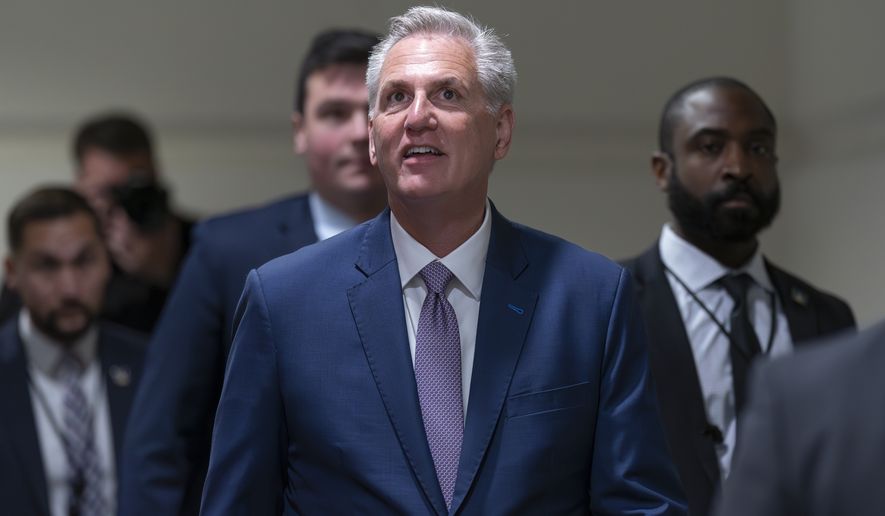House Republicans narrowly passed legislation raising the debt limit on Wednesday. The move is gambit to force President Biden to begin negotiations in earnest on cutting spending in exchange for lifting the cap on how much the government can borrow to meet expenses.
In the 217-to-215 vote, nearly every House Republican voted to raise the debt limit by $1.5 trillion until May 2024 while slashing spending by $4.8 trillion. Speaker Kevin McCarthy can only lose four votes on any single House bill before having to rely on Democrats.
Overall, four Republicans joined nearly every single Democrat in voting against the bill. Two Democrats and one Republican did not vote.
GOP leadership said the bill’s passage now puts Mr. Biden and Senate Democrats on the spot as the government faces a default deadline in early summer.
“Here’s our opening offer,” said House Rules Committee Chair Tom Cole, Oklahoma Republican. “We don’t have one from the president. We have a Democratic Senate that can’t produce one. So, we’re going to put the ball over and see what you guys are actually going to do with it.”
The bill cuts federal spending by $130 billion for the upcoming fiscal year and limits budget growth to 1% annually over the next decade. It also would rescind at least $90.5 billion in unspent pandemic relief, cancel Mr. Biden’s student loan forgiveness program, and scrap green energy tax credits that Democrats passed last year.
Beyond cutting spending, the legislation overhauls the nation’s energy-permitting laws, imposes work requirements on social welfare programs, and requires congressional approval for any new regulations with an economic impact of more than $100 million per year.
“If you look at this package, it represents the most common sense, straightforward approach to addressing the spending problem that got us here as we confront the debt ceiling,” said House Majority Leader Steve Scalise, Louisiana Republican.
The bill’s passage does not mean it will become law. Senate Majority Leader Charles E. Schumer has said the legislation is dead on arrival within the Democratic-controlled Senate.
Mr. Biden has similarly said he will veto the measure. The president has refused to negotiate with House Republicans on raising the debt limit, saying both Democrats and Republicans helped create the more than $31 trillion national debt.
“This is a ransom note,” said Rep. James McGovern, Massachusetts Democrat. “They say that in order for us to pay our bills for one year, we have to make 10 years of deep cuts that will hurt our constituents.”
The bill marks a personal victory for Mr. McCarthy. The California Republican staked his credibility as House speaker on the legislation, saying that without a united GOP front, his leverage in future negotiations with the president would be diminished.
Mr. McCarthy almost didn’t get there. Earlier in the week, the legislation was bogged down by divisions among Republicans.
Conservatives aligned with the House Freedom Caucus threatened to oppose the bill unless work requirements were upped from 20 hours to 30 hours per week for people to receive Medicaid, food stamps, and direct cash payments. They also wanted requirements to kick in next year rather than in 2025.
Apart from work requirements, GOP lawmakers were also divided on repealing the green energy tax credits that Democrats passed last year as part of Mr. Biden’s $739 billion climate law.
Republicans representing the Midwest, in particular, were conflicted about gutting the credits for ethanol, as they benefit farmers.
Mr. McCarthy initially refused to accept amendments to the legislation because of time constraints. The speaker’s allies said the bill needed to pass before lawmakers left Washington at the end of April if Republicans had any hopes of starting negotiations with Mr. Biden.
“We’re done negotiating, and we’re going to get this bill through,” said House Republican Conference Vice Chairman Mike Johnson, Louisiana Republican. “I think we’re close. No changes.”
That position proved unsustainable, however, as GOP opponents refused to yield. Mr. McCarthy bowed to the pressure, forcing through changes to the legislation during a late-night Rules Committee hearing that lasted into Wednesday morning.
To pacify conservatives, Mr. McCarthy agreed to have work requirements phase-in next year as opposed to 2025. The broader push to expand work requirements to 30 hours per week was rejected amid opposition from moderate Republicans representing districts that Mr. Biden won in 2020.
For Midwest Republicans, Mr. McCarthy agreed to keep some of the green energy and biofuel subsidies in place, including for companies that already had locked-in projects.
“I will always stand with the farmers who feed America,” said Rep. Derrick Van Orden, Wisconsin Republican who had expressed reservations about gutting the tax credits. “That is a win for Wisconsin and America.”
The changes helped Mr. McCarthy get closer, but success was still not assured. Several GOP lawmakers remained publicly on the fence.
Rep. Nancy Mace, South Carolina Republican, was opposed to the bill because of concerns it did not properly balance the budget. She was convinced to change her position after a conversation with the speaker.
“I feel heard by the speaker and I will support the debt ceiling bill today,” said Ms. Mace.
Not everyone was sold, however. GOP Rep. Tim Burchett of Tennessee opposed the bill, saying he was opposed to raising the debt ceiling on principle.
Likewise, Florida GOP Rep. Matt Gaetz voted against the bill despite getting Mr. McCarthy to offer concessions on tightening work requirements.
Also voting against were GOP Reps. Ken Buck of Colorado and Andy Biggs of Arizona.
• Haris Alic can be reached at halic@washingtontimes.com.




Please read our comment policy before commenting.